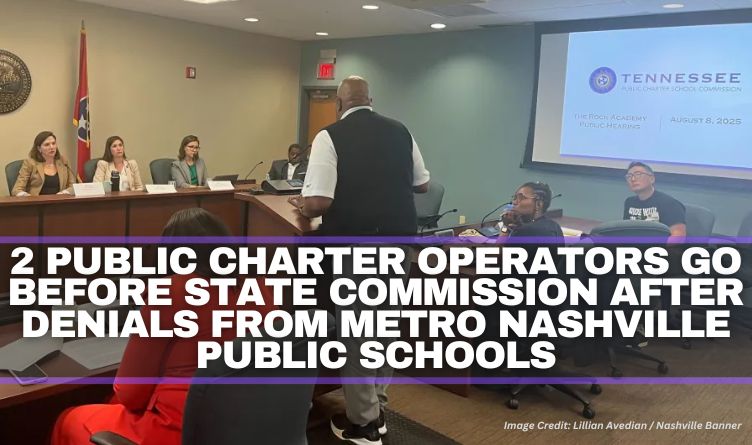The Rock Academy and The Forge School, denied by MNPS, make their cases before the newly empowered body.
Image Credit: Lillian Avedian / Nashville Banner
Image: The Ben West and Justice A.A. Birch Buildings. Image Credit: Martin B. Cherry / Nashville Banner
This story was originally published by the Nashville Banner. Sign up for their newsletter.
**Note from The Tennessee Conservative – This article posted here for informational purposes only.
by Lillian Avedian, [The Nashville Banner, Creative Commons] –
The Tennessee Public Charter School Commission held public hearings on Friday morning for two public charter school sponsors appealing the denial of their applications by Metro Nashville Public Schools.
The Rock Academy and The Forge School are pursuing new start appeals for the 2026-2027 school year. MNPS determined that each school only partially met standards regarding academics, operations and financial plans.
Since 2021, the Tennessee Public Charter School Commission, made up of nine members appointed by the governor, has considered new start appeals from charter school sponsors that fail local approval processes. A law that went into effect on July 1 significantly expanded the commission’s power: SB 1310 authorizes public charter school sponsors whose application denials have been overturned by the commission three or more times in a three-year period to bypass the local school board and apply directly to the commission.
By 8:30 a.m. Friday, a conference room at Davy Crockett Tower was full of community members wearing T-shirts reading “Ride with the Rock,” the crowd spilling out into the hallway. Representatives from the school sponsor presented their case to the commission, with members of the MNPS board and charters schools office detailing their reasons for denial of the application. The second hearing was subsequently moved to a larger conference room to accommodate the crowds, where supporters donned green T-shirts emblazoned with The Forge School logo.

Differing approaches
The Rock Academy aspires to be the first opportunity public charter school in Nashville designed to serve at-risk students. The 9-12 school would offer a mastery-based learning model, under which teachers do not deliver direct instruction to a classroom en masse. Instead, students learn at their own pace based on their individual needs, while teachers circulate and provide support as needed.
“We’re offering an evidence-based, community-driven solution,” said Dr. Ahmed White, the school’s lead founder and executive director. “We’re giving a lifeline for the nation’s most vulnerable youth.”
The Rock Academy also touted its later start time, with instruction between 9:30 a.m. and 4:30 p.m. — two and a half hours after the MNPS start time — as an example of its flexible model.
MNPS officials expressed concerns that the mastery-based learning model relies on asynchronous instruction, which it said is not a proven method for educating chronically absent students, who rely on structure to succeed. It also argued that there is a strong correlation between late start times and absenteeism.
At several points in the hearing, White offered his personal experience as a guarantee of the school’s success. White is the executive director of Project Reflect Inc./Smithson Craighead Academy, a charter school in Madison.
“Everywhere I’ve been, I’ve been able to make a change and make turnarounds,” he said.
Several parents and community members offered emotional testimony in support of The Rock Academy, drawing from personal experiences facing inequities growing up within MNPS and wondering whether their lives would look different today if they had attended a school like The Rock Academy.
Commission chair Tess Stovall questioned The Rock Academy’s promise to provide free, universal transportation — a primary factor in addressing chronic absenteeism — while recruiting students across the city, considering that the application provides for two buses: “There is no physical way that two buses would be sufficient,” she said.
White told the Banner that partners could potentially help with transportation “As a first opportunity charter school, we know that there’s some things we’re going to learn even as we go forward,” he said. “But as an experienced leader, that’s what I’m used to doing.”
To date, The Rock Academy has raised $1.7 million in funding and aims to fundraise $1 million each year. The amended application acknowledges, “To express it simply — our model is expensive.”
The second school sponsor to appear before the commission, The Forge School, aspires to equip students to pursue careers in architecture, construction and engineering. The 6-12 school would offer cross-cutting coursework and certifications applicable to various industries while providing mentorship, networking and hands-on work experience.
“In my 16 years of education, I cannot count the number of times I’ve heard a student ask, ‘Why do I need to know this?’ What we learned from the articulated pathways model was that focusing on CTE is answering that very question,” said co-founder Derrick M. Williams, referring to career and technical education.
Students would engage in grade-level career exploration, peer mentorship and technical projects in middle school, progressing to work-based learning, job shadowing and dual enrollment in high school, culminating in a senior capstone.
The Forge School would be led by co-founder Sarah Tuttle, who is a former director at MNPS. Danny Herron, the president and CEO at Habitat for Humanity of Greater Nashville, and Larry Atema, the president and CEO of Commonwealth Development Group Inc., were both present to offer their support.
Among those giving public comment in support of The Forge School were parents excited about the prospect of enrolling their children, who have already expressed an interest in building and design, and young professionals who wish they had the chance at an early age to begin pursuing their passion for these fields.
The Forge School has raised $1.3 million so far, aiming to raise $2 million within its first five years.
The MNPS school board expressed concerns that both charter schools in District 4, where The Forge School hopes to open, are currently underenrolled.
“That location has not been a healthy place for charters,” MNPS board chair Freda Player told the Banner. “They are a very community-oriented region, and they support their local community schools.”
Commissioner Stovall also questioned the plan to recruit 25 full-time employees to launch the school, saying that city schools already struggle with recruitment. “It is a national shortage of qualified teachers, and then thinking about the specialized nature of the teachers you need,” she said.

Choices, choices
A consistent criticism from MNPS is that both The Rock Academy and The Forge School replicate existing programs. Representatives from the schools pushed back against that assessment.
Referring to two similarly styled schools, which he characterized as “reactionary, short term, late stage interventions,” White said they are “not designed to meet the long term needs of students at risk of disengagement,” and that the Rock is aiming to fill that gap.
In regards to The Forge School, MNPS officials stated that because Nashville is a full-choice district, students already have the option of accessing comparable CTE programming in zoned and magnet schools, including STEAM and the Innovative School Models grant.
“We provide depth and breadth in our niche approach integrating the ACE pathways,” Tuttle responded. “At the core of this difference is our collaborative learning model, where industry professionals and school staff co-design curriculum and learning experiences for our students.”
The commission also questioned the speed with which MNPS denied the amended applications, each of which are more than 400 pages long. The school board received the applications on May 23, the Friday before Memorial Day, and finalized its denial on May 29. MNPS representatives said they dedicated a single day to reviewing each application that week.
Tuttle took exception to this approach. “You put a year of your life into traveling around the country researching best practices … to understand if you were going to do something different and unique that could add to the options in this city,” she told the Banner. “To have that reviewed in a single eight-hour work day, it’s hard.”
Summarizing MNPS’ denial of the two applications, board chair Player told the Banner: “The intent may be good, but it’s always important to go through implementation and details … to make sure that the best for the students is also sustainable and fiscally responsible, and that all of the rubrics are being met.”
The commission will make a final decision regarding the two applications during a virtual meeting on Aug. 27 that is open to the public.




One Response
The Rock, “trying” to polish turds, The Forge is artsy craftsy.